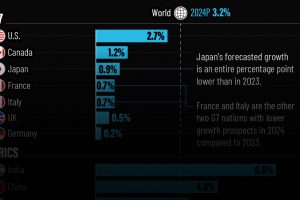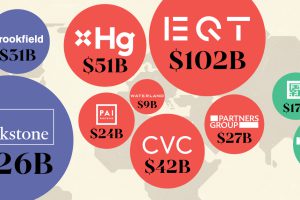Ranked: The Largest Trading Partners of the U.S.
The U.S. economy grew 5.7% in 2021, the fastest pace since 1984, bouncing back from the economic downturn created by the pandemic. But as supply chain issues reared their head and international restrictions came in and out of play, how did the country’s trade situation shape up?
America’s trade deficit of goods shot up to a whopping record $1.1 trillion in 2021 from $922 billion in 2020, leading to its largest ever deficit. Imports dwarfed exports, reaching new highs of $2.9 trillion in 2021, while U.S. exports to other countries added up to $1.8 trillion.
Using the latest data on international trade from the U.S. Census Bureau, we’ve visualized the flow of America’s annual imports and exports for selected countries. The difference between the two measures is the country’s trade deficit for goods.
Who Does the U.S. Trade Most With?
In 2021, U.S trade of goods amounted to nearly $4.6 trillion and Canada, Mexico, and China were America’s largest trading partners. Those three countries alone combined for a total trade of $1.9 trillion, equal to about 41% of all trade of goods.
Let’s take a look at the 10 countries that trade the most with the United States:
| Rank | U.S. Trade Partners | Goods Imports (in billion U.S. dollars) |
Goods Exports (in billion U.S. dollars) |
Total Trade (in billion U.S. dollars) |
|---|---|---|---|---|
| #1 | 🇨🇦 Canada | $357.2 | $307.6 | $664.8 |
| #2 | 🇲🇽 Mexico | $384.7 | $276.5 | $661.2 |
| #3 | 🇨🇳 China | $506.4 | $151.1 | $657.5 |
| #4 | 🇯🇵 Japan | $135.1 | $75.0 | $210.1 |
| #5 | 🇩🇪 Germany | $135.2 | $65.2 | $200.4 |
| #6 | 🇰🇷 South Korea | $95 | $65.8 | $160.8 |
| #7 | 🇬🇧 United Kingdom | $56.4 | $61.5 | $117.9 |
| #8 | 🇹🇼 Taiwan | $77.1 | $36.9 | $114 |
| #9 | 🇮🇳 India | $73.3 | $40.1 | $113.4 |
| #10 | 🇻🇳 Vietnam | $101.9 | $10.9 | $112.8 |
| Total | $2.85 Trillion | $1.76 Trillion | $4.61 Trillion |
From a geographic perspective, the two largest trading partners are based in North America (Canada and Mexico). Meanwhile, six of the top 10 are based in Asia.
Which Countries Does the U.S. Have the Largest Trade Deficit With?
The largest trade deficit is undoubtedly with China, which accounts for more than 32% of the U.S. trade deficit in goods.
The $355 billion deficit with China comes from importing $506 billion in goods such as machinery, furniture, and bedding. Interestingly, many of those imports are made by American companies who outsource their production to China. These outsourcing activities are counted as imports even though they create profit for these U.S. companies.
Below we order U.S. trade partners by trade deficit of goods:
| Rank | U.S. Trade Partners | Goods Trade Deficit (in billion U.S. dollars) |
|---|---|---|
| #1 | 🇨🇳 China | $355.3 |
| #2 | 🇲🇽 Mexico | $108.2 |
| #3 | 🇻🇳 Vietnam | $91.0 |
| #4 | 🇩🇪 Germany | $70.1 |
| #5 | 🇯🇵 Japan | $60.2 |
| #6 | 🇮🇪 Ireland | $60.2 |
| #7 | 🇨🇦 Canada | $49.5 |
| #8 | 🇲🇾 Malaysia | $41.0 |
| #9 | 🇹🇼 Taiwan | $40.2 |
| #10 | 🇮🇹 Italy | $39.3 |
| Total Deficit | $1.09 Trillion |
The second largest U.S. trade deficit is with Mexico with $108 billion. The main imports from Mexico are cars, trucks, and auto parts. On the other side, the main exports are auto parts and petroleum products.
How Does a Trade Deficit Affect the U.S. Economy?
The U.S. has been running trade deficits since the late 1970s, so these latest numbers are a continuation of a long-term trend. Are these trade deficits a bad thing? The simple, unsatisfying answer is, it depends.
When any country spends more money on imports than it makes on exports, it must somehow make up the shortfall. Typically, this means takes the form of borrowing from foreign lenders or allowing foreign investment in domestic assets. In the U.S., the trade imbalance with China is a sore point, as millions of jobs in manufacturing have been lost due to offshoring in recent decades.
That said, running a trade surplus is no guarantee of strong economic performance. Germany is a prime example of a country with a massive trade surplus, but achieving only modest economic growth in recent years.





